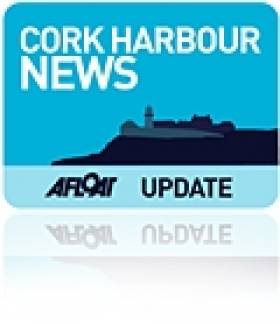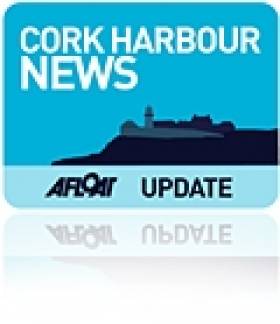Displaying items by tag: Camden Fort
Camden Fort Meagher on Cork Harbour is set to reopen to the public in the coming weeks after extensive remediation works.
As RTÉ News reports, the fort is “one of the finest remaining examples of a classical coastal artillery fort” and played a crucial role in coastal defence for nearly 400 years after it was first established in the 16th century.
The fort was one of the Treaty Port installations handed over to the Irish Defence Forces in 1938, and has been in Cork County Council hands since 1989.
Volunteers led a campaign since 2010 to rescue the fort from potential dereliction but as volunteer Daniel Maverley says: “We could only take it so far. The Council came in…and they are taking it to the next stage.”
Some €480,000 in investment — including funding of €160,000 from the Department of Housing, Local Government and Heritage — included restoration on the casemate block which houses the fort’s primary exhibitions.
A full review of the potential of the fort was carried out late last year, the council says, with “future phases of development identified to preserve Camden Fort Meagher’s historical significance, as well as contributing significantly to the local community and economy”.
The council has also committed to recruiting 10 seasonal guides and will soon appoint a contractor to run the fort’s cafe, with a view to having the fort open up to five days a week — while €750,000 of accessibility measures are in the planning stages.
RTÉ News has more on the story HERE.
A new exhibition on the role of the Royal National lifeboat Institution is coming to Cork Harbour's Camden Fort Meagher In Crosshaven and will be open to the public every weekend during this coming month of July.
The bravery of RNLI volunteers who risked their lives to save others during the First World War are the focus of an exhibition touring the UK and Ireland, Hope in the Great War.
The exhibition features six inspirational lifeboat rescue stories from around our coasts during the war. During the Great War, lifeboat crews launched 1,808 times, rescuing 5,332 people. And it was often down to the older generation to go to the aid of those in danger at sea, while many of the younger men were on active duty.
Among the stories featured in the exhibition are Cromer RNLI lifeboat's rescue of the Pyrin and Fernebo, which saw 33 people saved from the sea on 9 January 1917, and the 1914 Whitby RNLI lifeboat rescue of the wrecked hospital ship HMHS Rohilla which saw 144 people saved from the sea.
It is touring for four years – the length of the war – and opened on 4 February 2014 in the RNLI's Henry Blogg Museum in Cromer.
The exhibition was made possible by an Arts Council England grant of £78,200 awarded to the RNLI in order to share more widely the role of the charity's coastal community volunteers during WW1 to help mark the centenary. Community groups have come together to create interactive artworks to help tell the stories of the RNLI during the Great War.
Jacqui Palmer who is co-ordinating the exhibition, says: "As the world remembers the tragic events of the Great War, it's important that we also remember the courage and determination of those who risked their own lives to save others at a sea.
More than 15,000 people have visited the exhibition so far and community groups have been creating amazing artworks for the exhibition, so it's been a great way for everyone to come together and learn about the courageous work of our RNLI volunteers and coastal communities during the conflict."
Countdown to Cork Harbour Open Day
This will be the third Cork Harbour Day which is to cover a wide range of events, such as concerts on Spike Island, a photographic exhibition in Camden Fort, guided tours of an Irish naval ship at Cork City Quays and an open day at the National Maritime College of Ireland (NMCI).
In addition Fastnet Line's ferry Julia will be open for the public to board. The 22,161 gross tonnes serves the Cork-Swansea route and for the Open Day she will be berthed at Ringaskiddy Deepwater Berth instead of the nearby ferry terminal. To read details of Open day programme visit www.corkharbour.ie and updates click HERE.
The concept for the Harbour Open Day emerged three years ago, which combined various stakeholders involved in the development and implementation of the Integrated Strategy for Cork Harbour. A group comprising of representatives from UCC, City and County Councils, the Naval Service and the Port of Cork set about working together to engage with users of the harbour and to organise the Open Day.
Cork Harbour is the second largest natural harbour in the world, next to Sydney Harbour, offering beautiful locations for enjoying the outdoors, dramatic coastlines, and excellent leisure facilities, and is home to some very talented artists, sportsmen and women, and people who are passionate about the history, heritage and cultural value of Cork Harbour.
- Spike Island
- Cobh
- Cork Harbour
- naval service
- National Maritime College of Ireland
- port of Cork
- Cruise Liners
- Cork Harbour Open Day
- NMCI
- Ports and Shipping
- Cobh Cruise Terminal
- Cork Harbour News
- Cunard Line
- Queen Elizabeth
- Cruise ships
- Cork City Quays
- Camden Fort
- Port of Cork Company
- Ringaskiddy Deepwater Terminal

























































